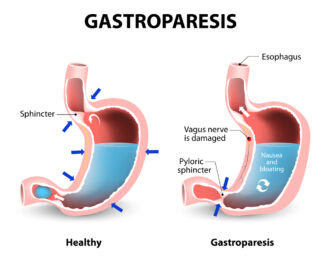
Advanced Chiropractic & Nutritional Healing Center
Suite 107
Frederick, MD 21704

More Weight Control, Nutrition & Exercise Articles
What In the World Is Gastroparesis?

Gastroparesis, also called delayed gastric emptying, is a disorder that slows or stops the movement of food from your stomach to your small intestine. Normally, after you swallow food, the muscles in the wall of your stomach push the food into the small intestine to continue digestion. When you have gastroparesis, your stomach muscles work poorly or not at all, and your stomach takes too long to empty its contents. Gastroparesis can delay digestion, which can lead to various symptoms and complications.
Who Is More Likely To Get Gastroparesis?
You are more likely to get gastroparesis if you have diabetes, had certain cancer treatments like radiation therapy on your chest or stomach area, or if you have had surgery on your esophagus, stomach, or small intestine, which may injure the vagus nerve.
The vagus nerve controls the muscles of the stomach and small intestine. If the vagus nerve is damaged, or stops working, the muscles of the stomach and small intestine do not work normally. The movement of food through the digestive tract is then slowed or stopped.
Gastropareses can also show up in people with scleroderma, hypothyroidism, nervous system disorders, such as migraine, Parkinson’s disease, multiple sclerosis and in people with gastroesophageal reflux disease (GERD), eating disorders, and amyloidosis.
Gastroparesis more commonly affects women than men.
What Are Some of the Symptoms?
The symptoms of gastroparesis may include feeling full soon after starting a meal, feeling full long after eating a meal, nausea, vomiting, excessive bloating and belching, pain in your upper abdomen, heartburn, and poor appetite.
More severe symptoms include pain or cramping in your abdomen, blood glucose levels that are too high or too low, red blood in your vomit or vomit that looks like coffee grounds, sudden, sharp stomach pains that don’t go away, feeling extremely weak or fainting, and difficulty breathing. Other symptoms include dehydration, extreme thirst and dry mouth, urinating less than usual, feeling tired, dark-colored urine, sunken eyes or cheeks, light-headedness or fainting, malnourishment, losing weight without trying, loss of appetite, and abnormal paleness of the skin.
Can Gastroparesis Be Treated?
Treatment of gastroparesis depends on the cause, how severe your symptoms and complications are, and how well you respond to the different treatments. Sometimes treating the cause may stop gastroparesis. If diabetes is causing your gastroparesis, then controlling your blood glucose levels may help. When the cause is unknown, then the focus is on relieving symptoms and treating complications.
Changing your eating habits can also help control gastroparesis. Getting the right amount of nutrients, calories, and liquids will treat the disorder’s two main complications of malnutrition and dehydration.
Emphasis is also placed on helping the muscles in the wall of your stomach work better and controlling the nausea and vomiting and reducing the pain.
Other Articles You May Find of Interest...
- Five Reasons to run a marathon: Get your trainers on…
- MAY MARKS CELIAC AWARENESS MONTH
- Lifestyle Changes To Lower Cholesterol
- Let’s Get Physical: Making Physical Activity a Part Of Your Family Life
- Bariatric Surgery and Sleep Apnea
- Top 4 Benefits Of Enrolling In Nutrition Courses Today
- Essential Guide to Safely and Effectively Assessing Health Supplements

















